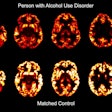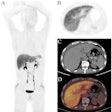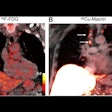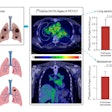Chinese clinicians have provided evidence in a “real-world study” that shows amyloid PET imaging is effective for diagnosing and managing patients with Alzheimer’s disease, according to a study published February 8 in Alzheimer’s and Dementia.
In patients treated at a memory clinic at Huashan Hospital in Shanghai, amyloid PET scans detected brain pathology associated with the disease and led to changes in treatment plans in 36.5% of patients, noted lead author Ke-Liang Chen, MD, a neurologist at Fudan University.
“In this large, real-world study, we found that [beta amyloid]-PET led to the changes in etiological diagnosis, diagnostic confidence, and treatment plan, providing new evidence for the use of [amyloid beta]-PET in Chinese population,” the group wrote.
The clinical utility of amyloid PET scans has been systematically studied in many other countries. These scans detect beta-amyloid plaque deposits, one of the hallmarks of Alzheimer’s disease, using radiotracers that bind to beta-amyloid cells.
Yet only a few studies with small sample sizes have been performed in Chinese participants, the researchers wrote. Moreover, due to this lack of evidence, amyloid PET scans have yet to be reimbursed by the Chinese medical insurance system, they added.
To address this evidence gap, between 2019 and 2023, the researchers recruited 1,073 patients to participate in a trial. All patients underwent PET scans using F-18 florbetapir (Amyvid, Avid Radiopharmaceuticals), an amyloid PET tracer approved in the U.S. in 2012.
“The patients had a cognitive complaint considered to be possibly due to AD and might benefit from the knowledge of brain amyloid status by the dementia specialist,” the authors noted.
At post-PET scan visits, neurologists changed diagnoses from Alzheimer’s disease (AD) to non-AD in 135 participants and from non-AD to AD in 72 participants. These diagnoses changed more often because of negative rather than positive PET results, with more frequent changes seen in early-onset cases (people with AD before the age of 65), the authors noted.
Amyloid PET results also led to a change of treatment plans in 392 of 1,073 patients (36.5%), with the use of cognition-specific drugs increasing significantly from 78% to 96%, the group wrote. Finally, the authors found that amyloid PET scans increased neurologists’ confidence in diagnoses from 69% to 86%.
"[Beta amyloid]-PET has significant impacts on the changes of diagnoses and management in Chinese population. Early-onset cases are more likely to benefit from [beta amyloid]-PET than late-onset cases,” the group wrote.
Ultimately, the study provides robust evidence that amyloid PET scans provide diagnostic benefits in the Chinese population. Next steps will focus on the financial impact of the approach, the group wrote.
“Additional economic data are required to be combined to assess the cost-effectiveness of [beta amyloid]-PET in clinical routine,” the researchers concluded.
The full study is available here.





![Pittsburgh Compound B (PiB) PET distribution volume ratio (DVR) images were projected onto fsaverage surfaces from FreeSurfer and surface smoothed, with PiB (amyloid) slope maps created using ordinary least squares regression (time as only factor) and mixed effects models for 154 participants run at each vertex (P < .01; model: longitudinal Geriatric Depression Scale score estimated by amyloid slope × time + [sex + education + age] × time). This map visualizes the results of the linear mixed-effects models (t score of the main variable, amyloid slope × time) such that regions with a greater t score (red) represent areas in which greater depressive symptoms are associated with greater amyloid accumulation (amyloid slope). Anatomical landmarks are provided: L refers to the left hemisphere, R refers to the right hemisphere, and additional labels indicate the anterior and posterior ends of the brain. Images available for republishing under Creative Commons license (CC BY 4.0 DEED, Attribution 4.0 International) and courtesy of JAMA Open Network.](https://img.auntminnie.com/files/base/smg/all/image/2024/08/PET_depression.66cf997f7e441.png?auto=format%2Ccompress&fit=crop&h=167&q=70&w=250)














